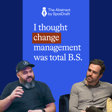
GCs in the Boardroom: Lisa Harrington, Board Director, Consultant, and CLO
Joining a board as a GC presents a unique set of challenges: how do you demonstrate value when many boards are looking for members with financial and strategy experience? How do you avoid becoming the de facto legal counsel? And how can you maximize your board experience to expand and strengthen your network and legal skill set?
Lisa Harrington, board director, consultant, and CLO, can coach you through this complex process. Currently the board director at A-Rod’s Slam Corp and Iron Horse Acquisitions, Lisa has complimented her career as CLO and corporate secretary with a yearslong journey through public and private board rooms.
Join Lisa as she offers her fellow GCs experience-proven advice on the best ways to find your first board seat, thrive on a committee as an expert advisor, and eventually make your way to a role on a coveted public board.
Read detailed summary: https://www.spotdraft.com/podcast/episode-22
Topics:
Introduction: 1:28
Comparing and contrasting GC roles at public and private companies: 4:24
Finding opportunities on to take on board directorships or take on board seats: 8:48
Setting yourself up to get recruited for board membership: 15:01
Describing the ongoing obligations of a board member or director: 21:39
Factors to consider for GCs looking to join a board: 25:08
Non-legal-related advice for drafting your board agreement: 28:17
Making strong connections with operators: 31:53
Going through the IPO process with Iron Horse: 37:49
Participating on a board during an acquisition at Slam Corp: 41:37
Leaving a board role with grace: 44:45
Advice to younger self: 47:10
Connect with us:
Lisa Harrington - https://www.linkedin.com/in/lisahattonharrington/
Tyler Finn - https://www.linkedin.com/in/tylerhfinn
SpotDraft - https://www.linkedin.com/company/spotdraft
SpotDraft is a leading CLM platform that solves your end-to-end contract management issues. Visit https://www.spotdraft.com to learn more.



















